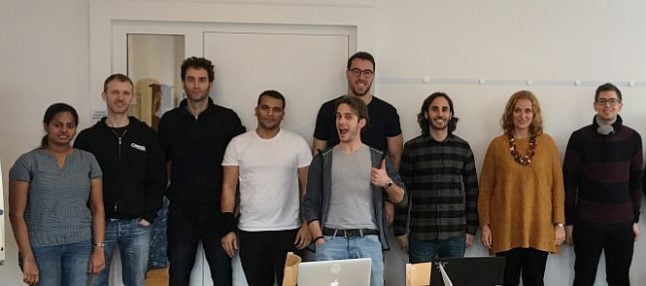Programming. Sure, that will land you a great job, but it’s only for certain people, right? And something you have to learn through endless years of studying math and computer science.
A group of students and instructors in Zurich’s Technopark district, the hub of Switzerland’s digital future, are quietly disproving this conventional wisdom. They’re part of the first class of Propulsion Academy, the first Swiss “code academy”.
“In the business world today, IT is everywhere. If you don’t understand the technology from the inside, you get stranded,” says Mattias, a 26-year-old business analyst who decided to enrol in one of Propulsion’s programmes.
Even though he already has a degree from Swiss business school HSG in Saint Gallen, Mattias felt he was lacking an important skill set they didn’t teach him at business school.
“I got tired of the IT guys telling me that things are possible, or more often impossible, without any way for me to check. I want to be able to talk back to these guys, but for that I need to be a programmer myself. Otherwise I will always be the business guy who doesn’t understand,” he explains.
Find out more about Propulsion Academy
The goal of Propulsion’s innovative approach is to fill Switzerland’s glaring need for IT experts. By 2022, the country will need an estimated 87,000 developers, according to the trade organization ICT Switzerland.
And there’s simply no way that the traditional training grounds for engineers in Switzerland – the federal universities (ETH and EPFL) and technical schools (Fachhochschulen) – can reach that level by churning out a mere 500 or so master’s degrees each year.
“There is nothing contradictory in the activities of Propulsion Academy and universities like ETH”, says Bertrand Meyer, a software engineering professor at ETH who is also on the Propulsion Academy advisory board. “The universities have a different goal, and they do not come close to fulfilling developer needs. Propulsion fills the gap.”
Propulsion Academy offers a new proposition: instead of slow and broad, the process of becoming a programmer should be fast, focused, and exciting.
How fast?
We’re talking three-months fast – that’s how long it takes to complete Full-Stack Development, the first track of Propulsion Academy.
And what exactly is “Full-Stack Development”? It’s all about programming. It’s centered on the end-to-end (hence “Full-Stack”) skills that many Swiss companies badly need to be competitive in a digital world.

Finishing the Propulsion programme in three months requires students to stay focused
“Seeing the Propulsion curriculum was like a dream come true”, says Julie, a 27-year-old software engineer who moved to Zurich from India last year and enroled at Propulsion to add a new set of skills that were more in demand in Switzerland.
The industry needs people who can see the big picture and handle the all the processes, from start to finish, and that’s what Propulsion Academy is all about.
Most of the students are in their twenties or thirties. While they come from many different backgrounds, they all share the same passion.
There are no hierarchies here, and no competition. Mutual help is the order of the day.
For Georgia too programming is a new challenge. A native of Greece and graduate of the Athens University of Economics and Business, she found her initial area of expertise too constraining.
“Programming is cool”, she says. “It’s also where the jobs are.”
Propulsion also offers a Data Science track, which trains experts how to efficiently handle big data – a key need for many Swiss companies – and an area where experts are in short supply.

Students showcasing their Friday projects.
While the code academy concept has already taken off in the US, UK, France, and other countries, it’s relatively new to Switzerland.
“There are lots of opportunities in IT here in Switzerland,” says Laurent Meyer, Co-founder and Dean of Propulsion.
“But access is mainly limited to those who've spent their careers in the field. With Propulsion, we open it up to everyone.”
Click here to learn more about Propulsion Academy
Bogdan Vasile, co-founder and himself a bootcamp graduate, adds “getting through one of our intensive programmes is all about motivation, hard-work, and curiosity. If you get these ingredients right, you'll become a software developer through our bootcamp model and move on to an IT job soon afterwards.”
And it’s not just Propulsion Academy students and management who believe in the concept. Thomas Flatt, president of SwissICT, the country’s largest ICT industry professional association, sees the programme as an excellent way for advancing your IT career in Switzerland.
“The goal is to be ready for the labour market in three months which means total focus,” he says.
“Career-changers, technology enthusiasts, or computer scientists looking to realign themselves with current market needs should all apply. This programme is for you.”
This article was produced by The Local and sponsored by Propulsion Academy.



 Please whitelist us to continue reading.
Please whitelist us to continue reading.